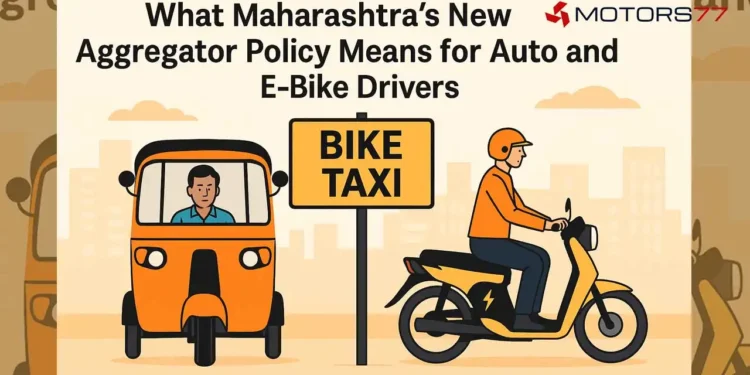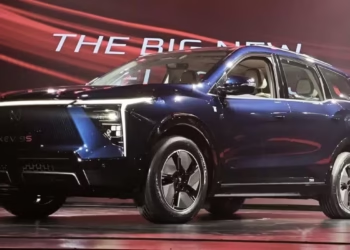Maharashtra’s transport ecosystem is entering a new era of regulation and reform. In early October 2025, Transport Minister Pratap Sarnaik confirmed that the state government will soon implement a comprehensive aggregator policy for app-based taxis, auto-rickshaws, and electric bike taxis.
This policy aims to bring fairness, transparency, and sustainability to India’s growing ride-hailing sector while ensuring that drivers receive better protection and passengers enjoy safer, more reliable services.
Overview of the Policy
App-Based Cabs and Auto-Rickshaws
The new rules formalize several long-debated aspects of app-based transport operations.
Key provisions include:
- Penalties for cancellations:
Drivers who cancel accepted rides will be fined 10% of the fare or ₹100, whichever is lower. Passengers who cancel without valid reason may pay 5% of the fare or ₹50, whichever is less. - Fare regulation and surge limits:
All fares must align with Regional Transport Authority (RTA) base rates. Aggregators can offer discounts up to 25%, and surge pricing will be capped at 1.5× the base fare. - Driver earnings protection:
Drivers must receive at least 80% of the total fare, effectively capping the aggregator’s commission at 20%. - Safety and data compliance:
Operators are required to integrate GPS tracking, emergency contact systems, and a grievance redressal mechanism. Driver background verification and compliance with data protection norms are mandatory.
These measures are designed to create a fairer and more transparent ecosystem, balancing driver welfare with passenger convenience.
Electric Bike Taxi Regulations
The most transformative part of Maharashtra’s new framework is the legalization and regulation of electric bike taxis.
Key points include:
- Only electric two-wheelers will be permitted; petrol or diesel bikes are excluded.
- Aggregators must maintain a minimum fleet of 50 e-bikes and pay a ₹1 lakh licensing fee plus a ₹5 lakh security deposit. Licenses will be valid for five years.
- Drivers must be between 20 and 50 years of age, hold a commercial licence with a PSV badge, and complete police verification and health checks.
- Rides can be booked only via apps—street hailing is not allowed.
- Each vehicle must be painted yellow with the words “Bike Taxi” in reflective lettering.
- Both the rider and the passenger must wear yellow helmets, which must be sanitized after every trip.
- Trips are capped at 15 kilometers, and working hours are limited to 8 hours per day.
- Apps must include GPS tracking, panic buttons, 24×7 control rooms, and options for passengers to select female drivers where available.
- City-level RTAs may set local fare caps, route regulations, and safety standards.
By focusing exclusively on electric vehicles, the state is linking this reform to its broader EV Policy 2025, encouraging sustainable mobility and reduced emissions.
Implications for Drivers
Advantages and Opportunities
- Legal recognition and protection
For years, many bike-taxi operators worked in a regulatory grey zone. The new policy grants them full legal recognition, shielding compliant drivers from penalties and harassment. - Fairer pay and reduced exploitation
The 80-percent-fare rule ensures that drivers retain a substantial share of each trip’s revenue, curbing excessive aggregator commissions. - Balanced cancellation rules
Clearly defined penalties for both drivers and passengers discourage unfair cancellations, leading to steadier ride volumes and improved reliability. - Enhanced safety and accountability
The mandatory inclusion of GPS tracking, panic buttons, and health checks creates safer conditions for both drivers and riders. - Electric-mobility incentives
Drivers who shift early to e-bikes may gain from future state incentives and higher ride demand in the sustainable transport segment. - Environmental and public-health benefits
Promoting zero-emission vehicles supports cleaner cities and aligns with India’s broader climate goals.
Challenges and Concerns
- High upfront and maintenance costs
Electric bikes have higher purchase and battery replacement costs compared to petrol models. Without adequate financing or subsidies, this burden may fall on drivers. - Operational limitations
Trip distance and working-hour caps could restrict income potential, particularly for drivers seeking full-day employment. - Barrier to entry for small operators
The requirement for aggregators to maintain minimum fleets and manage infrastructure may make it difficult for independent drivers or smaller firms to enter the market. - Implementation inconsistencies
Some cities have already reported licensing disputes, as local authorities interpret new rules differently. This uneven rollout could delay adoption in some regions. - Ongoing union concerns
Driver associations for ride-hailing platforms have warned of strikes if the policy is enforced unevenly or without adequate consultation. - Risk of penalties
Strict enforcement is already underway, and non-compliance with fare, cancellation, or safety rules may lead to fines or app suspensions.
Recommendations for Drivers
- Partner only with licensed and compliant aggregators.
- Evaluate the total cost of ownership before switching to electric vehicles, including charging, battery replacement, and insurance.
- Keep all documentation, permits, and fitness certificates valid and updated.
- Avoid unnecessary ride cancellations to prevent fines or app deactivation.
- Monitor fare distribution closely to ensure proper payout compliance.
- Follow safety, uniform, and equipment regulations consistently.
- Join local driver associations to stay informed about policy updates and rights.
- Advocate for government support in financing and insuring electric two-wheelers.
Conclusion
Maharashtra’s aggregator and e-bike taxi policy marks a major step toward a structured, fair, and environmentally responsible transport ecosystem.
For drivers, it promises better pay transparency, safer conditions, and legal recognition—but it also introduces stricter compliance requirements, limited flexibility, and higher upfront costs.
The long-term success of this initiative will depend on consistent implementation, collaboration between aggregators and regulators, and active participation from drivers themselves.
If executed effectively, the policy could position Maharashtra as India’s benchmark for sustainable, organized, and driver-friendly app-based transportation.










